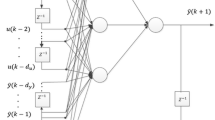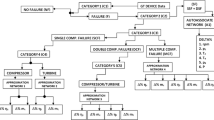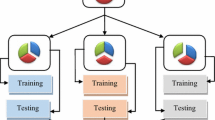Abstract
Gas turbines operate in harsh environments for long periods of time and their performance will inevitably degrade. Real-time evaluation of gas turbine performance is of great importance for both safety and economy. Considering that gas turbine sensors often fail in harsh environments, in order to improve the reliability of gas turbines against sensor failures, a model for optimizing the robustness of gas turbine performance evaluation against sensor failures is proposed. This model combines just-in-time and ensemble learning algorithms based on deep neural networks. By building local models and then ensemble learning, the influence of parameter changes on the global model is reduced. In this paper, taking gas turbine efficiency as an example, the robustness optimization effect of different models is tested by several robustness evaluation methods. It is found that the proposed model can better optimize the robustness of the evaluation, with the highest accuracy and best fit under various disturbances.
Similar content being viewed by others
Reference
H. M. Kwon, S. W. Moon, T. S. Kim, D. W. Kang, J. L. Sohn and J. Lee, A study on 65 % potential efficiency of the gas turbine combined cycle, Journal of Mechanical Science and Technology, 33 (9) (2019) 4535–4543.
S. Zhong, D. Liu, L. Lin, M. Zhao, X. Fu and F. Guo, CAE-WANN: A novel anomaly detection method for gas turbines via search space extension, Quality and Reliability Engineering International, 38 (6) (2022) 3116–3134.
J. H. Lee, J. H. Jeong, D. W. Kang and T. S. Kim, Quantification of variations in the compressor characteristics of power generation gas turbines at partial loads using actual operation data, Journal of Mechanical Science and Technology, 37 (3) (2023) 1509–1521.
M. Talaat, M. H. Gobran and M. Wasfi, A hybrid model of an artificial neural network with thermodynamic model for system diagnosis of electrical power plant gas turbine, Engineering Applications of Artificial Intelligence, 68 (2018) 222–235.
L. Wang, Y. G. Li, M. F. Abdul Ghafir and A. Swingler, A rough set-based gas turbine fault classification approach using enhanced fault signatures, Proceedings of the Institution of Mechanical Engineers — Part A — Power and Energy, 225 (8) (2011) 1052–1065.
T. Gronstedt, Least squares based transient nonlinear gas path analysis, Proceedings of the ASME Turbo Expo, New York, USA (2005).
D. L. Doel, Interpretation of weighted-least-squares gas path analysis results, Journal of Engineering for Gas Turbines and Power, 125 (3) (2003) 624–633.
P. Dewallef and O. Léonard, On-line performance monitoring and engine diagnostic using robust Kalman filtering techniques, Proceedings of the ASME Turbo Expo, Atlanta, Georgia, USA (2003).
A. J. Volponi, H. DePold, R. Ganguli and C. Daguang, The use of Kalman Filter and neural network methodologies in gas turbine performance diagnostics: A comparative study, Journal of Engineering for Gas Turbines and Power, 125 (4) (2003) 917–924.
R. Luppold, J. Roman, G. Gallops and L. Kerr, Estimating inflight engine performance variations using Kalman filter concepts, 25th Joint Propulsion Conference, Monterey, USA (1989).
M. Tahan, E. Tsoutsanis, M. Muhammad and Z. A. Abdul Karim, Performance-based health monitoring, diagnostics and prognostics for condition-based maintenance of gas turbines: A review, Applied Energy, 198 (2017) 122–144.
X. Wang and H. Liu, A knowledge-and-data-driven soft sensor based on deep learning for predicting the deformation of an air preheater rotor, IEEE Access, 7 (2019) 159651–159660.
Y. Shen and K. Khorasani, Hybrid multi-mode machine learning-based fault diagnosis strategies with application to aircraft gas turbine engines, Neural Networks, 130 (2020) 126–142.
S. M. Raghavan, A. Palatel and J. Simon, Artificial neural networks based parametric curve generation for health assessment of industrial gas turbine systems, Process Integration and Optimization for Sustainability (2023) https://doi.org/10.1007/s41660-023-00372-5.
C. W. Hong and J. Kim, Exhaust temperature prediction for gas turbine performance estimation by using deep learning, Journal of Electrical Engineering and Technology, 18 (4) (2023) 3117–3125.
A. Tayal, A. Solanki and S. P. Singh, Integrated frame work for identifying sustainable manufacturing layouts based on big data, machine learning, meta-heuristic and data envelopment analysis, Sustainable Cities and Society, 62 (2020) 102383.
D. Bertsimas, V. Gupta and N. Kallus, Data-driven robust optimization, Mathematical Programming, 167 (2) (2018) 235–292.
P. D. Pantula and K. Mitra, Towards efficient robust optimization using data based optimal segmentation of uncertain space, Reliability Engineering and System Safety, 197 (2020) 106821.
C. Ning and F. You, Data-driven decision making under uncertainty integrating robust optimization with principal component analysis and kernel smoothing methods, Computers and Chemical Engineering, 112 (2018) 190–210.
C. Shang and F. You, A data-driven robust optimization approach to scenario-based stochastic model predictive control, Journal of Process Control, 75 (2019) 24–39.
K. M. Gumte, P. Devi Pantula, S. S. Miriyala and K. Mitra, Data driven robust optimization for handling uncertainty in supply chain planning models, Chemical Engineering Science, 246 (2021) 116889.
L. V. Gurvich, Reference books and data banks on the thermodynamic properties of individual substances, Pure and Applied Chemistry, 61 (6) (1989) 1027–1031.
L. Zheng, B. Wang, L. Zhao, S. Zhang and Y. Xiao, The cooling air and firing temperature estimation for GE’s heavy duty gas turbines, Proceedings of the Chinese Society of Electrical Engineering, 39 (23) (2019) 6934–6943.
Y. Xiao, Study on Simulation for Thermodynamic Characteristic of Heavy Duty Gas Turbine Flow Passage under Off-Design Conditions, Changsha University of Science & Technology, China (2017).
C. Cheng and M.-S. Chiu, A new data-based methodology for nonlinear process modeling, Chemical Engineering Science, 59 (13) (2004) 2801–2810.
K. Fujiwara, M. Kano, S. Hasebe and A. Takinami, Soft-sensor development using correlation-based just-in-time modeling, AIChE Journal, 55 (7) (2009) 1754–1765.
Z. Ge, Quality prediction and analysis for large-scale processes based on multi-level principal component modeling strategy, Control Engineering Practice, 31 (2014) 9–23.
I. Buzhinsky, A. Nerinovsky and S. Tripakis, Metrics and methods for robustness evaluation of neural networks with generative models, Machine Learning, 112 (2021) 3977–4012.
L. Wang, Y. G. Li and M. F. Abdul Ghafir, Rough set diagnostic frameworks for gas turbine fault classification, Proceedings of the ASME Turbo Expo, New York, USA (2013).
X. Pu, S. Liu, H. Jiang and D. Yu, Sparse Bayesian learning for gas path diagnostics, Journal of Engineering for Gas Turbines and Power, 135 (7) (2013) 071601–071608.
Y. G. Li, Gas turbine performance and health status estimation using adaptive gas path analysis, Journal of Engineering for Gas Turbines and Power, 132 (4) (2010) 041701–041709.
Acknowledgements
This work was supported by National Science and Technology Major Project (2017-I-0002-0002), China.
Author information
Authors and Affiliations
Corresponding authors
Additional information
Qiwei Cao is a Ph.D. candidate in the School of Energy and Environment at Southeast University. He obtained a master’s degree in power engineering from Nanjing University of Aeronautics and Astronautics. His research interests include gas turbines and neural network engineering applications.
Wenguo Xiang is a Professor in the School of Energy and Environment at Southeast University. He received his Ph.D. in thermal energy engineering from Southeast University. His research interests include gas turbines, clean coal combustion, thermal system optimization and control.
Rights and permissions
About this article
Cite this article
Cao, Q., Xiang, R., Chen, S. et al. Robustness optimization of gas turbine performance evaluation against sensor failures. J Mech Sci Technol 38, 1487–1495 (2024). https://doi.org/10.1007/s12206-024-0240-8
Received:
Revised:
Accepted:
Published:
Issue Date:
DOI: https://doi.org/10.1007/s12206-024-0240-8




